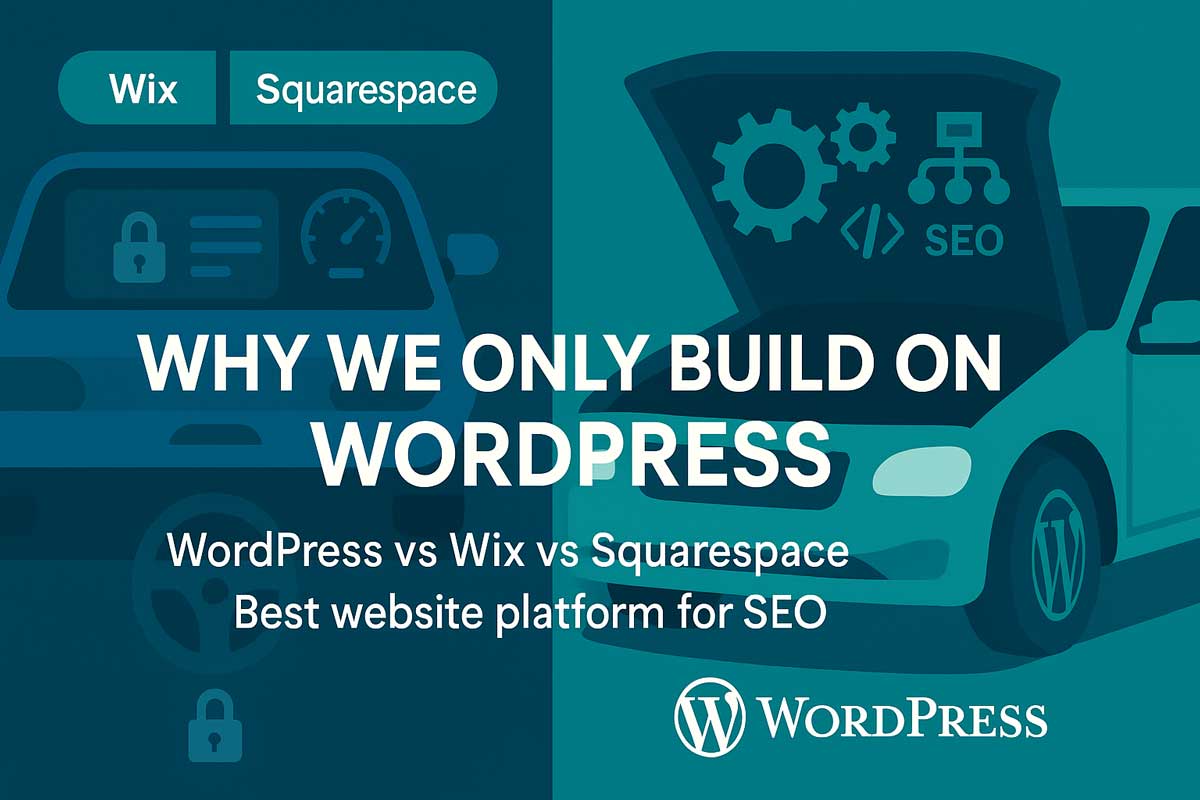TL;DR: WordPress vs Wix and WordPress vs Squarespace… We don’t use Wix, Squarespace or plug-and-play hosting templates because we simply can’t get fully under the bonnet — and that limits your performance, SEO, integrations, ownership, and ultimately growth.
Those tools are brilliant for getting started, but “easy now” can mean “costly later.” If you’re serious about growing your business, professional WordPress gives you the control and headroom you’ll need.
The “Under the Bonnet” Problem
Website builders and hosting-company templates are like sealed cars: attractive dashboards, limited engine access. For small, simple sites that’s fine. For growth, it’s a ceiling. When it comes to WordPress vs Wix vs Squarespace, the key difference is access. Wix and Squarespace lock you out of the engine room — WordPress is the best platform for SEO and lets us tune the entire machine. That’s why it consistently ranks as the best website platform for SEO.
Here’s what we can’t properly access or control on closed platforms and why you need to consider WordPress vs Wix or WordPress vs Squarespace:
Code & structure
Limited access to core HTML, CSS, JS and server configuration. Hard (or impossible) to implement custom content models, bespoke blocks, or complex user flows. You’re designing around a template rather than your business.
Performance & Core Web Vitals
Shared asset pipelines and theme bloat you can’t strip out. Limited control over image processing, caching layers, critical CSS, server response tuning (TTFB), and script loading strategy. Performance fixes become workarounds—not engineering.
SEO at a professional level
Basic meta fields are not “SEO.” You need:
Clean, controllable URL structures (including internationalisation).
Fine-grained indexation rules, canonical tags, and redirects.
Custom schema markup at scale (FAQ, Product, Service, Article, LocalBusiness).Control over sitemaps, robots rules, and log-level crawl diagnostics.
On closed systems these are often limited or bolted on.WordPress gives us full freedom to implement all of these, which is why SEO professionals agree it’s the best website platform for SEO.
Data model & content governance
Templates assume every business fits the same page types. In WordPress, we define Custom Post Types, taxonomies and custom fields to mirror your business logic — services, case studies, locations, team, resources, events — so editors work faster with fewer mistakes.
Integrations that actually integrate
CRMs, marketing automation, membership, e-commerce, booking systems, LMS — closed platforms gatekeep or charge extra per connection. With WordPress, we can pick best-in-class tools or build directly to an API.
Ownership & portability
On a walled platform, you rent. Migration is painful or partial. On WordPress, you own a portable stack: theme, plugins, database. Move host, change CDN, upgrade PHP — your site comes with you.
Compliance & accessibility
Cookie consent, tag governance, retention policies, and WCAG accessibility often need code-level fixes and testing pipelines. Templates can’t guarantee compliance; we can engineer it.
Security & recovery
You rely on platform-wide policies and update cycles. With WordPress, we control hardening, WAF/CDN rules, least-privilege roles, backups, staging, and rollback. If something breaks, we can fix it, not just “submit a ticket.”
“Easy” Can Be Costly in the Long Run with WordPress vs Wix vs Squarespace
“Easy” is valuable — especially for getting a first version live. But consider the hidden costs once you grow.
- Template lock-in: A redesign becomes a rebuild because content is glued to someone else’s theme structure.
- Plugin/app fees stacking: £x/mo for forms, £x/mo for bookings, £x/mo for analytics add-ons… soon your “cheap” site costs more than a tailored build.
- Missed leads due to speed/UX: Each second of delay hurts conversions. Performance ceilings are expensive when you’re buying ads.
- SEO limitations: If you can’t fix crawl issues, schema, or internal linking at scale, you’ll pay for ads you wouldn’t need.
- Integration friction: Manual copy/paste or brittle zaps waste time and create data errors.
Migration tax: Moving away later is harder, riskier, and more expensive than starting with an open stack.
When DIY Builders Make Sense (and When They Don’t)
Great for:
- A first landing page to test an idea.
- A personal site or event page with a short shelf life.
- A portfolio without complex filtering or SEO needs.
Not great for:
- Lead-gen sites needing speed, SEO, and funnels.
- Businesses with multiple services, locations, or languages.
- Sites that must integrate CRM, memberships, bookings, or e-commerce.
- Brands that will evolve — new offers, content types, and campaigns.
It’s perfectly reasonable to start with “easy.” Just know what it’s designed for: starting, not scaling.
Why Professional WordPress?
WordPress is open-source, enterprise-capable, and future-proof when crafted properly. In the WordPress vs Wix vs Squarespace comparison, this is where WordPress truly stands apart. It’s built for growth and flexibility — the best website platform for SEO, customisation, and business scalability.
- Custom architecture for your business
Content types, fields, and taxonomies that match how you sell. Gutenberg/Block Editor components you can reuse safely — fast publishing without breaking design. - Performance engineering
Optimised hosting, PHP versions, OPCache, CDN, HTTP/2/3. Asset budgets, critical CSS, image/CDN pipelines, route-level caching. Regular performance audits with measurable targets. - SEO and analytics built-in
Technical SEO foundations, schema at scale, smart internal linking. Clean sitemaps, structured redirects, log-file insights. Privacy-safe analytics and consent that actually complies. - Design without template compromise
Brand-true design systems, not “near enough” theme tweaks. Accessible components — colour contrast, focus states, keyboard navigation all built in. - Security, staging, and governance
Role-based access, activity logs, off-site and versioned backups. Staging environments for safe testing. Update policies and incident response you can rely on. - Integrations that grow with you
CRM (HubSpot, Salesforce), marketing automation, payments, bookings, LMS, membership — connected the right way. Headless options if you need app-like experiences later.
The Website Ownership Advantage
You own the code and content. No platform dictates your roadmap. You can switch providers (hosting, CDN, support) without rebuilding. You can iterate quickly because the bonnet opens — nothing’s glued shut.
A Simple Way to Decide WordPress vs Wix vs Squarespace
Ask yourself:
- Will my website need to rank for competitive search terms?
- Will I need speed and conversion to make paid traffic work?
- Will I need integrations (CRM, bookings, e-commerce, memberships)?
- Will my content structure get more complex over the next 12–24 months?
- Do I want to own my platform, or rent it?
If you answered “yes” to two or more of these, a professional WordPress build is almost always more cost-effective over time.
Real-World Cost Comparison (Typical Pattern)
- Year 1 on a builder: Low monthly fee plus multiple add-ons. Fast start, limited growth.
- Year 2: Add more features; fees stack. Hit performance and SEO walls. Conversion plateaus.
- Year 3: Replatform to something flexible (usually WordPress). Pay the migration tax you avoided at the start — plus lost opportunity from two years of “almost there.”
Alternative: Invest once in a scalable WordPress foundation, then spend your budget on marketing and content — not fighting your platform.
Our Promise
We build exclusively on WordPress so we can get under the bonnet and make your website work — for rankings, for conversions, and for growth. If a feature matters to your business, we can engineer it. No ceilings. No handcuffs. Just a solid platform you own.
Ready to Grow?
If you’re at the “let’s launch something” stage, we’ll help you map the fastest route. If you’re at the “we need this to perform” stage, we’ll build the engine.
Book a Quote/Planning/Discover Call → BOOK HERE
Frequently Asked Questions about WordPress vs Wix and WordPress vs Squarespace
When we talk to business owners about building or redesigning their websites, the same questions often come up — especially around why we’re so committed to WordPress and what the real differences are between DIY builders and professionally built sites.
Below we’ve answered some of the most common questions we hear, to help you decide what’s right for your business.
1. Why don’t you use Wix, Squarespace, or other website builders?
Because we can’t get fully under the bonnet. Closed platforms like Wix and Squarespace limit access to the core code, hosting environment, and SEO structure. That means we can’t fine-tune performance, integrate advanced tools, or future-proof the site properly. With WordPress, we have complete control to build a site that truly performs and grows with your business.
2. Aren’t platforms like Wix or Squarespace easier for beginners?
Yes — and that’s their biggest appeal. They make it easy to get something online fast. But “easy” often comes with hidden limits. Once you outgrow the basic setup, you’ll find that adding features, improving SEO, or customising design becomes frustrating or impossible. Easy today can mean expensive tomorrow.
3. What do you mean by “easy can be costly in the long run”?
4. Isn’t WordPress harder to manage?
Not when it’s set up properly. We build custom WordPress sites with a user-friendly editor, so you can easily update your own content without breaking anything. Behind the scenes, you get all the power and flexibility that professionals need for SEO, performance, and integrations.
5. Do I really need a professional web designer?
If you want your website to actively grow your business — not just sit online — then yes. A professional knows how to design for conversion, optimise for search engines, build fast and secure pages, and ensure your site scales with you. It’s an investment that saves money (and headaches) later.
6. Can you move my Wix or Squarespace site to WordPress?
Absolutely. We regularly migrate sites from closed platforms to WordPress, keeping your content and design intent intact — while giving you the freedom, SEO potential, and ownership you didn’t have before.
7. What makes WordPress better for SEO?
WordPress gives you direct control over URLs, metadata, schema markup, site speed, and technical elements like sitemaps and redirects — all the things Google cares about. Builders like Wix and Squarespace only give surface-level SEO tools. If ranking on Google matters, WordPress is the professional choice.
8. Who actually owns my website with WordPress?
You do. With WordPress, your site lives on hosting you control. You own your files, database, design, and content. With most builder platforms, you’re essentially renting space — and leaving can mean starting again.
9. How do I know if it’s time to move from a DIY site to a professional one?
If you’re spending more time fighting your website than growing your business — or if it’s not bringing in leads — it’s time. When you need proper SEO, better speed, or more complex functionality (like bookings, e-commerce, or memberships), a custom WordPress site is the next step.
10. What’s the process if I want to upgrade to a professional WordPress site?
We start with a Website Planning Call to understand your goals and growth plans. Then we design and build a bespoke WordPress site that reflects your brand, performs brilliantly, and is easy for you to manage. You’ll end up with a site that’s truly yours — and ready for growth.
Still have questions?
If you’re thinking about upgrading from a DIY builder, or you’re unsure whether WordPress is right for you, we’re happy to chat it through — no jargon, no pressure.

